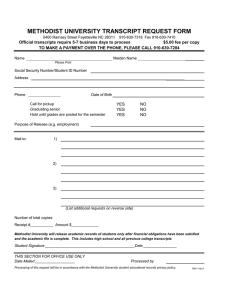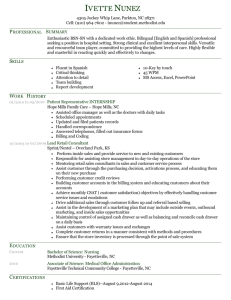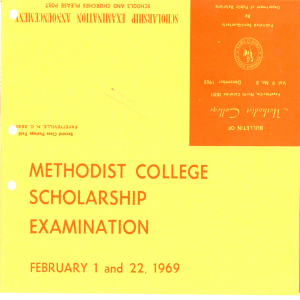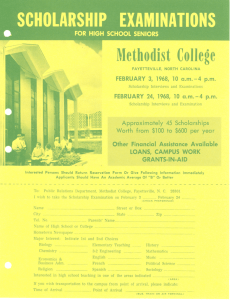Document 11937943
advertisement
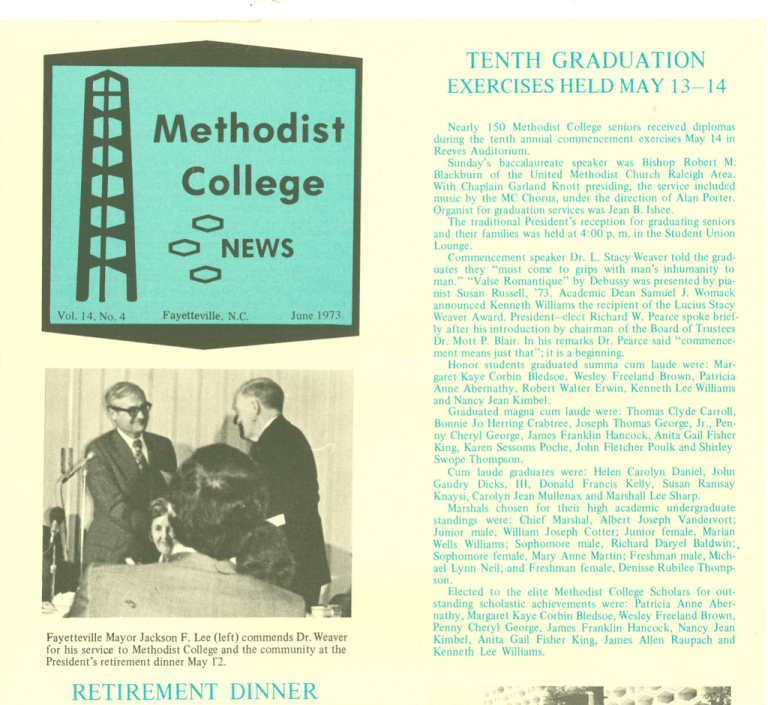
TENTH GRADUATION EXERCISES Methodist College o oo NEWS Vol. 14, No.4 Fayetteville. N.C. June 1973 Fayetteville Mayor Jackson F. Lee (left) commends Dr. Weaver for his service to Methodist College and the community at the President's retirement dinner May n. RETIREMENT DINNER HELD MAY 13-14 Nearly 150 Methodist College seniors received diplomas during the tenth annual commencement exercises May 14 in Reeves Auditorium. Sunday's baccalaureate speaker was Bishop Robert M. Blackburn of the United Methodist Church Raleigh Area. With Chaplain Garland Knott presiding, the service included music by the MC Chorus, under the direction of Alan Porter. Organist for graduation services was Jean B. Ishee. The traditional President's reception for graduating seniors and their families was held at 4:00 p. m. in the Student Union Lounge. Commencement speaker Dr. L. Stacy Weaver told the graduates they "must come to grips with man's inhumanity to man." "Valse Romantique" by Debussy was presented by pianist Susan Russell, '73. Academic Dean Samuel J. Womack announced Kenneth Williams the recipient of the Lucius Stacy Weaver Award. President-elect Richard W. Pearce spoke briefly after his introduction by chairman of the Board of Trustees Dr. Mott P. Blair. In his remarks Dr. Pearce said "commencement means just that"; it is a beginning. Honor students graduated summa cum laude were: Margaret Kaye Corbin Bledsoe, Wesley Freeland Brown, Patricia Anne Abernathy, Robert Walter Erwin, Kenneth Lee Williams and Nancy Jean Kimbel. Graduated magna cum laude were: Thomas Clyde Carroll, Bonnie Jo Herring Crabtree, Joseph Thomas George, Jr., Penny Cheryl George, James Franklin Hancock, Anita Gail Fisher King, Karen Sessoms Poche, John Fletcher Poulk and Shirley Swope Thompson. Cum laude graduates were: Helen Carolyn Daniel, John Gaudry Dicks, 1Il, Donald Francis Kelly, Susan Ramsay Knaysi, Carolyn Jean Mullenax and Marshall Lee Sharp. Marshals chosen for their high academic undergraduate standings were: Chief Marshal, Albert Joseph Vandervort; Junior male, William Joseph Cotter; Junior female, Marian Wells Williams; Sophomore male, Richard Daryel Baldwin;. Sophomore female, Mary Anne Martin; Freshman male, Michael Lynn Neil; and Freshman female, Denisse Rubilee Thompson. Elected to the elite Methodist College Scholars for outsjanding scholastic achievements were: Patricia Anne Abernathy, Margaret Kaye Corbin Bledsoe, Wesley Freeland Brown, Penny Cheryl George, James Franklin Hancock, Nancy Jean Kimbel, Anita Gail Fisher King, James Allen Raupach and Kenneth Lee Williams. HUNUK~ t'Kt~lUtN I ANU lVIK~. WtA V CK Three hundred friends from throughout North Carolina and college personnel gathered the evening of May 12 to honor Dr. L. Stacy Weaver, who will retire as Methodist College president this June. Featured speaker for the special dinner held in the college cafeteria, was Dr. Terry Sanford, president of Duke University and the first chairman of the Board of Trustees at MC. Dr. Sanford praised President Weaver for 50 years of service to education. Fayetteville Mayor Jackson F. Lee read the city council's citation commending the president for his service to Fayetteville. Additional Fayetteville honors came from E. J. Edge, chairman of the County Board of Commissioners, in the form of the Distinguished Service Award. Mrs. Weaver was presen ted with a Fayetteville sweetheart pin. Mayor Lee commented, "We would ordinarily give you a key to the city, but you've been good Fayetteville citizens for a long time." Methodist College Alumni Association President Cynthia A. Walker, honored Dr. Weaver with the association's first Distinguished Alumnus Award. State Representative Glenn Jernigan read the resolution passed recently in the North Carolina House of Representatives and Senate commending Dr. Weaver for his outstanding service to education ill North Carolina. Former Director of Public Relations at MC, Charles K. McAdams, paid tribute to Dr. Weaver's many years of service to the United Methodist Church. including several national committees. McAdams is now treasure I of the North Carolina Conference of the United Methodist Church. Bishop Robert M. Blackburn delivered the invocation. Special music was provided by Dr. Willis Gates, Grace Gates, Terry Terry and Timothy Brown. A cash gift was presented to Dr. and Mrs. Weaver an behalf of the group by Dr. Mott P. Blair, chairman of the college's Board of Trustees. From left: Albert Vandervort, Chief Marshal; President L. Stacy Weaver, Commencement speaker; and Bishop Robert M. Blackburn, Baccalaureate speaker. SUMMER SCHEDULE II 15 4223 . -.-7-August 20 June 26 185& 321 2 June June July July June August Sta Ie Lion Convention N. C. Annual Conference of The United Methodist Church N. C. Conference Music Workshop Carolina College Alumnae Day ACS of the United Methodist Youth Fellowship Summer R & R of the N.C. Conference of the United Methodist Church East Coast Cheerleading Camp Kenneth Lee Williams '73 (right) accepts the Lucius Stacy Weaver Award from Academic Dean Samuel J. Womack. The award honors the member of each graduating class believed to have best exemplified in personality and performance the qualities of academic excellence, spiritual development, leadership and service. ."-;" .. "THIS Commencement I BELIE Address Dr. Womack, our distinguished guests of th~ platform, young ladies and gentlemen of the graduating class, other friends of the college. We come again to one of those occasions which is both sad and happy. We come to the parting of ties which have become dear to us, and to the departure from familiar pathways. But we come also to mark the culmination of a journey which began for these young people at least sixteen years ago, and which will bring to them the realization of a goal to which they and we have looked forward. (t is inappropriate to begin any discourse with an apology. But I wish to apologize for the fact that these remarks are being presented from a written manuscript. I do not like to read speeches. In fact, in a rather lengthy life-time which has involved the making of thousands of speeches, this is only the second time I have ever attempted to read an address, the first being the inaugural address which I gave at Methodist College some years ago. But the necessities of the moment seem to make it advisable that my remarks today be reduced to writing. At least it will have the virtue of assuring their termination at the proper time and place. The young people whom we honor today are a select group. Of the group that began the educational journey with them sixteen years ago, statistically speaking, one-half never finished high school. About a third of the group who did graduate from high school en tered college. One-half of the group that entered college as freshmen is represented here today in the graduating class, or in other graduating classes at other institutions. So these young men and young women have already been selected out of a much larger group. This process of selection will continue. Perhaps 10% of them will pursue formal studies in graduate schools leading t9 professional preparation. All of them will continue their education through the life-long process of learning. As some wag once remarked, they are receiving their A.B. degrees today: the world will begin teaching them the rest of the alphabet. There is a strong temptation to spend the moments alloted to me this morning in reminiscing. During a half century of service to education I have seen many changes; some good, some bad; some temporary some lasting, but all interesting. But I shall forego the temptation to talk about these and rather take this opportunity to attest to you some of the things that I have come to believe as a result of the extended tenure of service I have been privileged to enjoy. All of us form value judgments. Indeed this is one of the good offices of the church college. Whether we form these judgments by deliberation or by failure to make decisions, we nevertheless arrive at them. Failure to decide is in itself a negative decision. And so as my parting message to the class of 1973, I wish to outline for them and for you some of the things that I believe. I. I believe in the divinity of human personality. I believe that there is a spark of the divine in the breast of each of God's creations. Sometimes we hide it, or anesthetize it, or otherwise neglect it. But when we take the pains to search for it, it is found in every human being. Thus I believe that people are important. I believe that people are tr.r. ,,~IWlhlp t() hp left in jpn()r:ml'e For these re:lsons r helieve in ;Jnd by Dr. L. Stacy VE " Weaver kingdom come" it is coming by heads and hearts and not by fangs and claws. You can't shoot virtue into people any more than you can beat light into a cellar with a club. But take in even the smallest candle and the greatest darkness cannot put it out. 2. I believe in the improvability of human personality. Some people do not. I have even heard teachers say when certain children showed up in school, "Oh, he belongs to such and such a family," as if this immediately condemned him for all time to come. Fortunately in God's providence the intelligence of children is not the mathematical mean of their parents. If so each child would always be less intelligent than the more intelligent parent and the race would approach a common level of intelligence where improvement would not be possible. I know this is not true. Great characters who have blessed humanity by their leadership and achievements have often come from unexpected places, many times out of great difficulty. John Milton was bowed down by the double night of blindness and poverty when he gave to the world that masterpiece of literature, Paradise Lost. Out of the deafness of Edison came the electric light and the phonograph. Stienmetz was so crippled by arthritis that his hands could not manipulate the inventions which his mind could can trive. Out of the deafness of Beethoven came marvelous symphonies of music. Out of a background of poverty and a questionable heritage came the great soul that was Abraham Lincoln. The story of the progress of the human race can almost be measured in the story of triumph over difficulties. The Romans had a phrase for it "Ad Astra Per Aspera", "to the stars through difficulties". A more modern poet phrased it a little differently when he said, Heights by great men reached and kept Were not attained by sudden flight, But they while their companions slept Were toiling upward in the night. 3. I believe that Christian education is the best means yet devised for the development of human personality. It begins in the home, is nurtured in the church school, and culminates in the church college. I know that there are formal stages of education beyond college in graduate schools, but these are largely training for professions and vocations. I believe that the value judgments which determine one's goals and direction of his life, and ultimately the contribution which he will make to his day and generation, are largely fixed and determined by the time he reaches the termination of his college years. So I believe in the vital necessity of the church-supported college. I use the term church-supported advisedly. I am not interested in the exercise in semantics which attempts to draw fine lines of distinction between the church-college, the church-related college, and the church-connected college. I prefer rather to refer to the church-supported college. Educational history amply demonstrates that those institutions which are supported with reasonable adequacy by their constituent bodies remain agencies of the church. Those that are not, do not. I could spend a good bit of time this morning establishing a rationale for the continuing need for church-supported colleges. I shall not take this ~I,':" have devoted my life to education. 1 also believe that the kind ot education that leads young people to form proper and valid value judgments is as important as the fact of knowledge itself. 1 believe that people are too valuable to be killed in war. We have destroyed more people violently during my lifetime than in all the rest of human history put together. Government reports would indicate that this nation has an indebtedness of about 400 billion dollars, largely accumulated to support war efforts, in addition to the amount we spent as we went along. Now, 1 do not know how much money that is. A school teacher doesn't have any business knowing anything about money like that. But did a little idle figuring one night when 1 was no better engaged and 1 found that if 1 could spend a dollar a second, continuously throughout the 24 hours of the day and night, 1would have had to have begun about the time of the Trojan War, 1200 years before the birth do not of Christ, to have spent even 100 billion dollars by now. know how many schools and colleges that would build and operate, how many hospitals it would construct and maintain, how many churches and highways it would provide, how much poverty and human misery it would wipe off the face of the earth. 1 only know that somehow or other mankind has to come to grips with the problem of man's inhumanity to man. [ am not naive enough to suggest that America, the richest and most envied nation in all history, can walk around in a world armed to the teeth and gone mad without some means of defense. 1 know there must be police forces among nations as there must be police forces within nations and communities. Civilization cannot exist in a world of lawlessness whether it be local, national, or international. But 1 know something else my young friends, and 1 think 1 know it very earnestly this morning, and that is if you are ever going to have the sort of world that you ask God for when you pray "Thy I I tIme. 1 am conVlIH..:euUl lHe Bulletin of Methodist College Fayetteville, N.C. 28301 Vol. 14, No.4 June, 1973 PUBLISHED SEMI-QUARTERLY BY Graduation day became a reality as the procession began to the auditorium. 1lt:'L..t;:,):,)llY tVI lUC;)\'" III;)lIlULJVll,> II ••1.1 ••.. church Itself is to survive, and if the sort of civilization which we call democracy is to continue. The democratic ideal was born with the Protestant Reformation and it still depends heavily upon the value judgments formed among the citizens by their acceptance of the truths of religion. 1 believe that the church college not only can survive but it must survive. [ believe that it will survive if it is true to its purpose. This alone makes it worthy of survival. Simply put, this purpose is to assist the church in informing, directing, shaping, and transforming the culture which we call civilization. To effectively perform this mission the church college must fulfill the two goals to which 1 dedicated Methodist College sixteen years ago; namely, that it be an institution of academic excellence, Christian in concept. These two goals remain. Those of us who have guided the destiny of the college thus far pass them on to our successors as beacons of guiding lights to show the way in a world beset by many darknesses. With entire equanamity of spirit and great confidence in the future, we commit this institution to younger and abler hands, with the full belief that a beneficent God whose benedictions have blessed and guided us will continue to watch over the college and those who direct its destiny. So may it be. And so my fellow members of the class of 1973, for you and for me, in these pleasant places at least, the long day's work is done. We congratulate you. We put our stamp of approval upon you and we bid you wdspeed. D~PARTMENT OF PUBLIC RELATIONS Second Class Postage Paid Fayetteville, N.C. 28301
